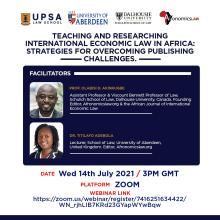The report has been commissioned by Fairtrade Germany and Fairtrade Austria with the purpose to gather food for thought for a policy position of Fairtrade on trade policy by looking critically into presumptions, theories and ideologies and glean some ideas off the mainstream. It is conducted by combining legal expertise in the area of international economic law with the expertise, knowledges, visions, opinions and aspirations of multiple actors who are active in the Fair Trade movement or have been reflecting on how to transform international trade and investment in light of the multiple social and environmental crises. The views expressed in this report do not represent the current thinking or attitudes of Fairtrade and are in the sole responsibility of its authors.


